Spider-view: “Powerless”
This arc's dive into deeper philosophical notions ends up shallower than intended, even if some of the premise's more practical applications are engaging
—by Nathan on March 3, 2022—
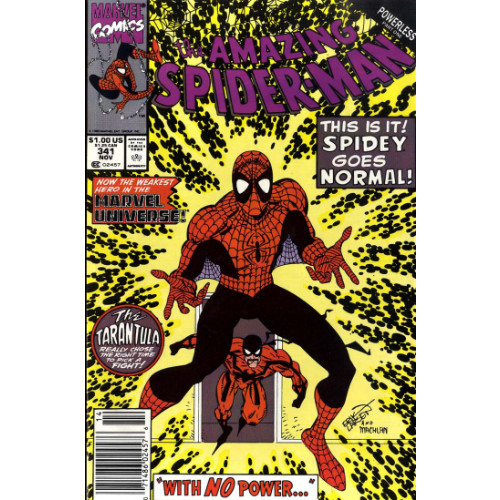
I recently spent nearly two handfuls of posts examining a story arc where Spider-Man gained incredible cosmic abilities which augmented his already-formidable, spider-derived powers. During this “Cosmic Spider-Man” arc, Peter gained greater mastery over his webbing, zapped lasers from his fingers and eyes, punched out the Hulk, and even flew like that caped guy over in Metropolis. At the end of the day, though, our hero’s regular levels of superhuman power were restored, leaving our Friendly Neighborhood Spider-Man his regular friendly, neighborly, spidery self.
As almost a counterpoint to that saga, David Michelinie and Erik Larsen decided to reverse the concept during this four-part tale: what if Spidey had no powers? It’s not the first time (nor would it be the last) that a writer explored the concept of no-powers Spider-Man. Other writers have tackled the idea wholesale–like Stan Lee and Steve Ditko in Amazing Spider-Man Annual #1–or toyed with the concept of Spidey temporarily losing particular abilities (one article I read pointed out the time Electro temporarily shorted-out Spidey’s suction power in “Revenge of the Sin-Eater”). Whereas the “Cosmic Spider-Man Saga” made Spidey even more superhuman, “Powerless” intended on making him…well, more human.
How does this narrative match up to the “Cosmic Spider-Man Saga”? Does taking away our hero’s gifts make him a better character than when his powers are amped up to 1100?
“Powerless”
Writer: David Michelinie
Penciler: Erik Larsen
Issues: Amazing Spider-Man #340-343
Publication Dates: October 1990-January 1991
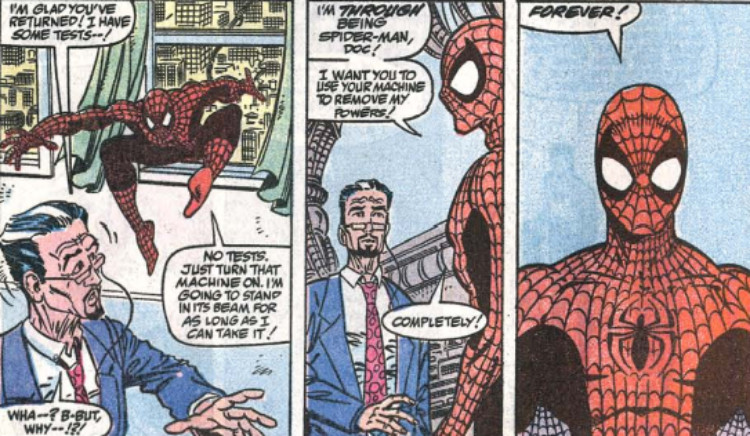
My biggest gripe with the “Cosmic Spider-Man Saga” was how it overstayed its welcome. An interesting concept, the “Saga” was nevertheless unable to find enough narrative interest or tension to generate consistent development. Though I could have, perhaps, written a one-and-done review covering the entire story, similar to this review, I chose to break it into chunks. The resulting story moved by inches, hindered by different writers tackling slightly different plots across three titles, which still generally boiled down to “Spidey fights a bad guy with his new powers…oh, and it’s usually not of his regular foes because 'Acts of Vengeance' is happening.” The whole escapade proved rather a slog.
Considering “Powerless” is confined to Amazing Spider-Man, with the same writer/artist team for all four issues, it makes sense to tackle the whole shebang at once. As a story, then, “Powerless” is not impeded by different agendas from different writers on different titles or even the machinations of a massive Marvel crossover. Self-contained and briskly told, “Powerless” proves itself a much easier read.
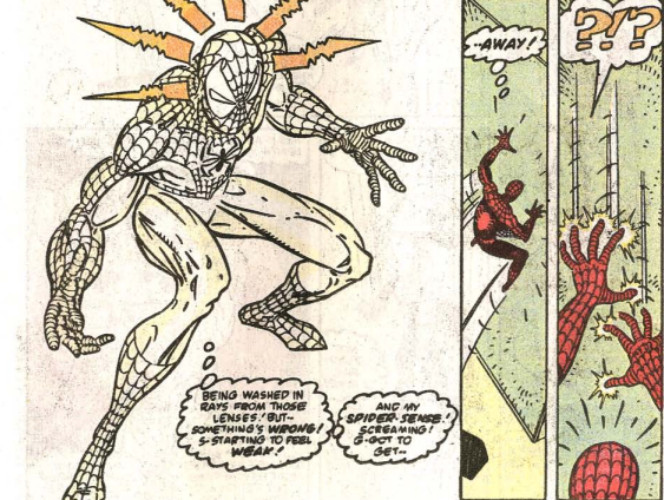
Nowhere does Michelinie telegraph this as a quasi-sequel to the previous “Saga” by providing, essentially, the opposite plot. Michelinie’s narrative is more closely tied to his “Revenge of the Sinister Six” epic, Peter’s decision to remove his powers tethered to Nathan Lubensky’s death during that arc. Peter sees the danger inherent in his position as Spider-Man, realizing that Aunt May will have no one to care for her if he dies while in action (to a slightly lesser extent, this includes MJ as well). The argument is interesting and not without merit–this isn’t the first time Spidey considered intentionally sacrificing his abilities, but the “Aunt May” component makes for a more character-driven motivation. The decision, at least, seems thought through, and Michelinie’s ability to connect to a previous arc gives “Powerless” some nice cohesion. I never felt like Michelinie springs the whole “Peter doesn’t want his powers anymore” concept on me too suddenly.
When Spidey goes through with this attempt to remove his spider-blessed abilities, Michelinie uses the following chapters to make some intriguing comments on Peter’s life. Without his powers, Peter can assume a more normal existence than he ever had before…mostly? I’ll discuss what I mean by that in a moment, but between any question marks and potential narrative hang-ups are genuinely interesting ideas Michelinie toys with. For the first time, Peter feels more tired, less energetic. He’s able to enjoy a picnic with MJ, Flash Thompson, and Felicia Hardy, using some of the more natural athleticism he’s developed. Heck, Michelinie even tethers Spidey’s power loss to a change in Felicia’s attitude–prior to this arc, she started dating Flash as a way to get back at Peter, plotting to break Flash’s heart as revenge for Peter dumping her. But Spidey’s power loss throws a spanner into that scheme, allowing her to see Flash more as a person rather than plot fulfillment. It adds a unique, genuine layer to the character, pulling her away from the potentially tiresome "vengeance on Peter Parker" plot and characterization she seemed stuck in since Spectacular Spider-Man #100.
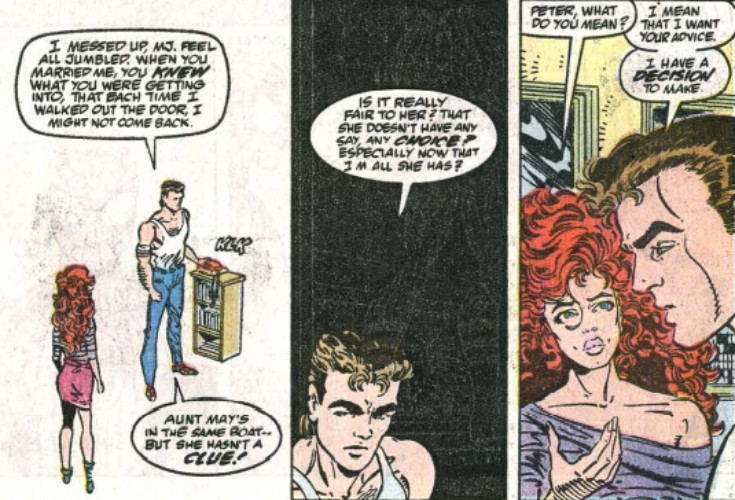
One early scene actually sees Peter try to swing after temporarily forgetting his power loss; the nearly tragic consequences end up being engagingly impactful–the scene caught me off guard and helped me realize just how much Peter counted on his strength and agility to swing successfully. Michelinie portrays this moment in particular as a new learning curve for Peter. The guy just shoots out a webline and launches himself off a rooftop; even the reader is barely given a moment to think about Spidey’s lack of powers before Spidey himself realizes he’s dangling over a gaping concrete canyon, high above the busy streets. The image is frightening (reminding me of a similar moment where Black Cat’s “bad luck powers” once caused Spidey’s equipment and powers to fizzle) and nicely sets up this concept of normality. Peter’s life, even temporarily, is going to be different. He has to think differently.
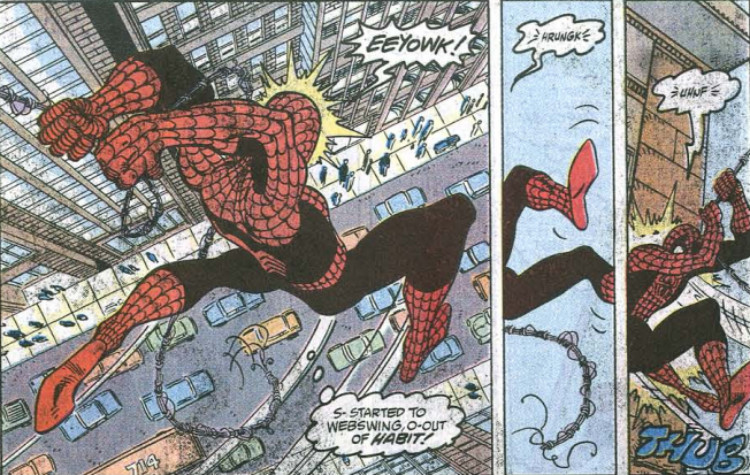
Yet as engaging as that concept is, Peter finds himself continually drawn back into action by a mysterious ringleader behind a dangerous operation. He squares off against both the Tarantula (seeking revenge for a previous scheme thwarted by the hero) and the Scorpion (who has a long-running vendetta against both Spidey and former Daily Bugle publisher J. Jonah Jameson) without his abilities. The idea is somewhat amusing–powerless Spidey trying to hold his own against his foes–and some well-timed help from Flash Thompson and Black Cat feel necessary to keep our hero alive (but not necessarily in a deus ex machina sort of way). But it represents a clash with Michelinie’s message. Here you have a normal Peter Parker, who removed his powers to stay alive and healthy for Aunt May’s sake, continually risking his life even without his abilities–with probably a lower chance of survival! I mean, think if Flash or Cat hadn’t gotten involved. Bye-bye, Spidey-not-Spidey.
I think, from the start, this is the dichotomy you were going to run into, especially understanding that Spidey’s power loss was intended to be temporary from the get-go. Michelinie sets this up as a clash of philosophies–which has greater priority, Peter’s responsibility to his aunt and wife as “Peter Parker, nephew and husband” or his responsibility to basically everyone else as “Spider-Man, superhero”? Bottom line, the writer points out, even without his powers, Peter’s still going to always try and do the right thing. A later scene sees Peter distract some thugs by throwing a brick through a window, bemoaning his decision to MJ as he wishes he had done more. “You did what you could!” MJ replies, “All you could!” And then she reminds him his decision to remove his powers, for May’s sake, was the right one.
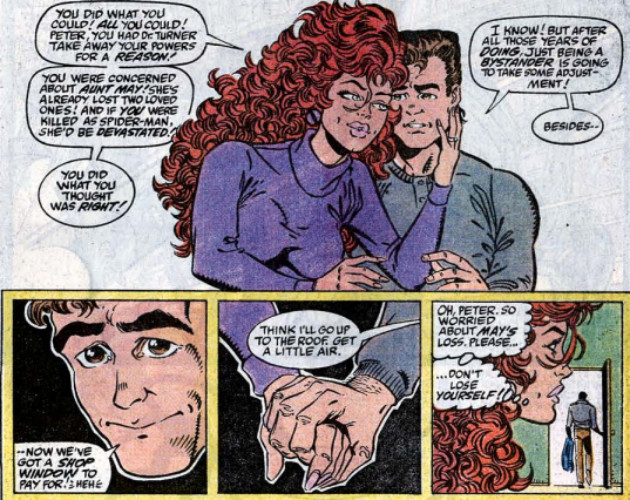
The struggle, for me, is knowing from the start where this story was going to end up. Peter’s powers were always going to be restored, and even without them, he was always going to do the right thing for the greatest number of people. It takes an engaging philosophical notion about Peter’s sense of responsibility and designates the answer even before the question is asked, because you know heading into this arc which direction it will lead. It sort of sucks some of the narrative power from the story. I really do think the in-between moments are stronger, like the panels where Peter basks in his normal life. Yes, these moments are fleeting, but even so, they’re a glimpse into what life could have been (or, hypothetically, still could be) for Peter if he really did lose his powers for good…or maybe never was bitten by the spider in the first place.
Part of my slight disgruntlement with the story’s direction may be that this isn’t the first time Peter’s gone through an internal crisis regarding his powers and identity. Stan Lee and John Romita’s famous “Spider-Man No More!” in ASM #50 had the hero temporarily ditch his costumed alter ego and move on. In that classic issue, Peter found himself unable to remove Spider-Man completely and, compelled by his sense of responsibility, took up the costume again. That is, essentially, the same concept here, with the added twist of Spidey’s powers being momentarily removed from the table. Admittedly, Spidey going so far as to ditch his spider-powered abilities gives this notion an edge–especially as it allows Spidey to resume as normal a life as he chooses to have–but the main crux is similar.
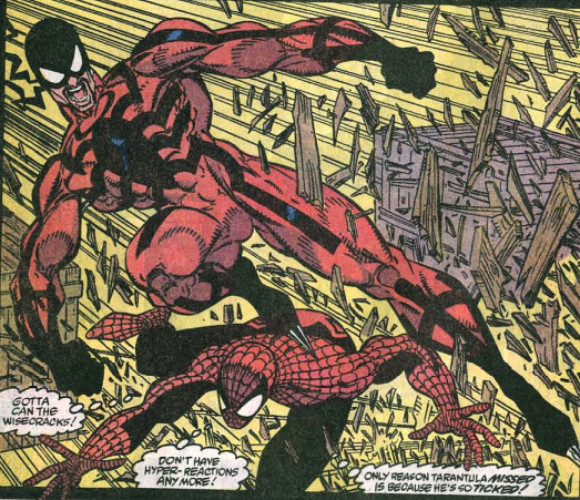
And I think the portion of that last sentence I wrote–“as normal a life as he chooses to have”--may be the core of what frustrates me about this arc. If you’re reading a comic with “Spider-Man” in the title don’t you think your main character will stay as human and normal only as long as the writer allows it? The decision, for Peter, doesn’t feel so much like a decision–and, even when it does (like when Peter chooses whether or not to get into a conflict even without his powers), he still decides to run headlong into danger, despite his reasons for having his powers removed in the first place. There’s almost a sense of “Well, what’s the point?” as you read the arc.
Also frustrating is Michelinie’s ending. A few posts ago, I pointed out a clumsily executed scene between Peter and May written by Gerry Conway during the “Cosmic Spider-Man” story arc. In that scene, Peter, randomly, brings up a sudden yet deep philosophical question, very randomly and awkwardly. Michelinie, in the last few pages, does the same exact thing. Peter asks May a question about danger and responsibility (basically, if he were in a position to save someone, but it was dangerous, should he?), and she answers accordingly (basically, “Heck, yes!”). There’s not much set up, and May’s response is more of a retort, bizarrely angry in its wording. Both scenes feel forced--May's always been Peter's go-to for wisdom, and though she spits facts with the best of them, neither Conway or Michelinie set up their scenes well or organically.
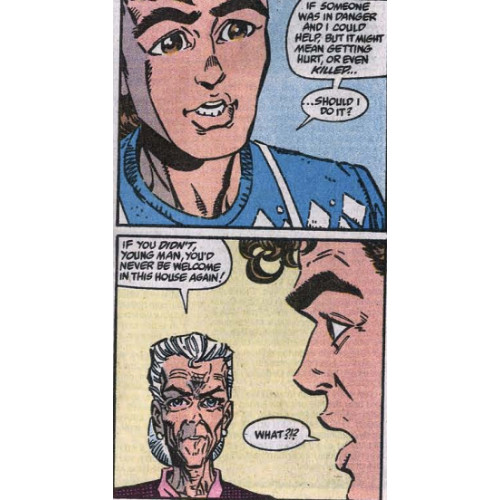
The scene also makes me wonder why Peter didn’t broach this subject with May earlier; based on her response, he may actually have never gone through with the whole “powerless” idea to begin with. Sure, the scene confirms May’s principles for Peter, but it seems like a lackluster attempt at bringing closure to the issue Peter was wrestling with–to be Spider-Man or not to be Spider-Man?–just to confirm that May is completely fine with him risking his neck for the safety of others. Oddly, Michelinie never brings up that Peter’s musings started with Nathan’s death, making me wonder if Peter should have just been honest with May from the start. In short, an odd scene.
“Powerless” certainly has a few advantages over the “Cosmic Spider-Man Saga”–it’s shorter, more direct. It tries wrestling with different notions by posing as the antithesis to the “Saga.” In some respects, Michelinie is definitely able to use the story to comment on Peter’s condition as a person–without his powers, Peter sees what life could be like as a regular guy (heck, even Felicia gets a taste of who she could be without her vendetta against Spidey). Yet this notion is hindered by its fleeting portrayal of Peter as a regular guy who, at day’s end, is always going to be a superhero and is always going to make the right decision based on his superhumanity (superhuman-ness?). I’ll admit, the story really could not have gone in any other direction–Peter’s change was always going to be temporary. But I do wish Michelinie had embraced the humanness of Peter Parker, stressing those elements instead of putting him back into the costume at the first sign of trouble. I think we could have received a more human Peter Parker instead of a powerless Peter Parker playing at hero–because, yes, he’s always going to be Spider-Man, so why can’t we enjoy some more Man when the Spider is subdued?